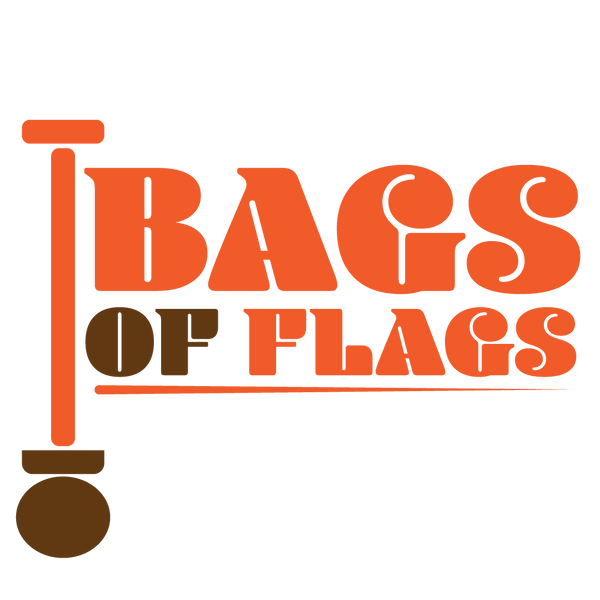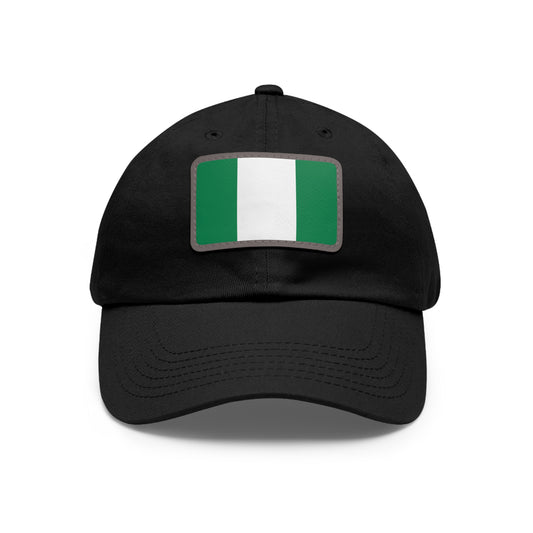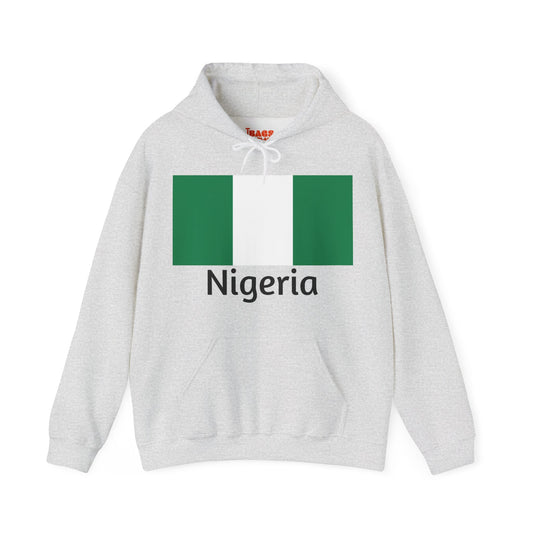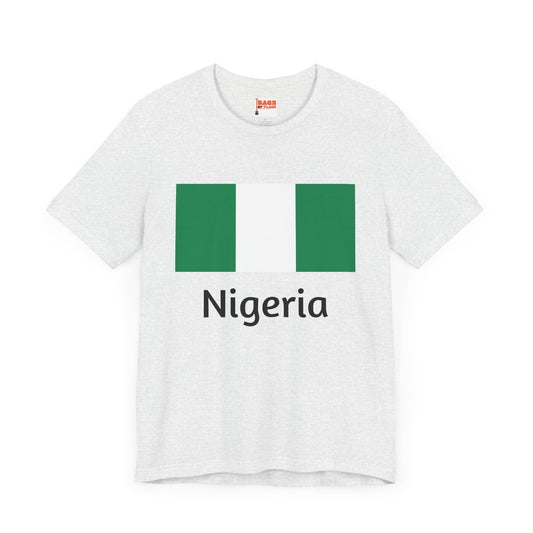-
Nigeria Sweatshirt
Regular price $34.15 USDRegular priceUnit price / per -
Nigeria Flag Sweatshirt
Regular price $34.15 USDRegular priceUnit price / per -
Nigeria Pillow
Regular price $22.65 USDRegular priceUnit price / per -
Nigeria Leather Patch Hat
Regular price $18.85 USDRegular priceUnit price / per -
Nigeria Hoodies
Regular price $34.40 USDRegular priceUnit price / per -
Nigeria T-shirts
Regular price $22.79 USDRegular priceUnit price / per -
Nigeria Flag Hoodies
Regular price $34.40 USDRegular priceUnit price / per -
Nigeria Flag on T-shirt
Regular price $22.79 USDRegular priceUnit price / per
Collection: Nigeria
The Nigeria flag symbolizes pride and unity for the African nation. Its vibrant colors and unique design deeply define the country and its people. We will delve into the flag's history, symbolism, and current relevance and uncover some interesting protocols and fun facts associated with it.
Overview of the Nigeria Flag

The Nigeria flag is characterized by its simplistic yet profound design, featuring three equally sized vertical stripes. The outer stripes are a vibrant green, while the central stripe is pure white. This straightforward arrangement captures the essence of Nigeria’s identity and aspirations. The flag's inception dates back to Nigeria’s independence from colonial rule, marking a new chapter in the nation’s history. Its design, the result of a national competition, signifies the collective spirit and vision of the Nigerian people. The green stripes symbolize the nation’s rich natural resources and commitment to agricultural excellence, a nod to the country’s reliance on its land for prosperity. The white stripe serves as a beacon of peace and unity, signifying the country’s dedication to fostering harmony and solidarity among its diverse population. With its bold colors and meaningful symbolism, this flag is a daily reminder of Nigeria’s enduring values and ongoing journey toward a bright and prosperous future.
Historical Context of the Nigeria Flag
The inception of the Nigeria flag is closely intertwined with the country’s journey to independence. Officially unfurled on October 1, 1960, the flag marked the culmination of Nigeria's struggle to become a sovereign nation free from British colonial rule. Its design was selected through a national competition, aiming to encapsulate the aspirations and collective identity of the Nigerian people at a pivotal moment in their history. Michael Taiwo Akinkunmi, a twenty-three-year-old student at the time, designed the winning entry, a simple yet profound representation of Nigeria’s hopes and dreams. The flag has remained untouched since its adoption, a testament to its enduring significance and the timeless values it represents. This continuity underscores the flag’s role as a national emblem and a piece of Nigeria’s ongoing narrative of resilience and unity in the face of challenges.
Symbolism Behind the Design and Colors
The Nigeria flag's distinct colors convey deep meanings tied to the nation's identity and aspirations. The twin green stripes flanking the flag symbolize Nigeria’s lush landscapes and wealth of natural resources, hinting at the country’s potential for agricultural prosperity and reliance on nature’s bounty for economic growth. This shade of green is not only a nod to the fertility of the land but also reflects the hope and ambition of the Nigerian people towards sustainable development and environmental stewardship.
Contrastingly, the central white stripe is a powerful emblem of peace and unity. This white space represents the bridge of harmony connecting various communities in a nation as ethnically and culturally diverse as Nigeria. It emphasizes the importance of transparency, integrity, and unity in governance, aiming to foster a peaceful coexistence among the populace. Moreover, the white color underscores Nigeria’s commitment to justice and the pursuit of a fair society where every citizen can thrive without the barriers of division.
Together, these colors do not merely adorn a flag but weave a narrative of resilience, unity, and aspiration. They encapsulate the spirit of the Nigerian people — ever hopeful, striving for peace, and grounded in the richness of their land and culture. In its simplicity, the flag embodies the essence of Nigeria’s past struggles, present achievements, and future ambitions, making it a timeless emblem of the nation's enduring spirit and collective dream.
Current Relevance of the Nigeria Flag
Today, the Nigeria flag remains a powerful symbol of unity and identity for Nigerians around the globe. It proudly flies at official functions, cultural events, and international gatherings, reinforcing citizens' sense of national pride. At sports events, the flag becomes a rallying point, with athletes and fans alike donning its colors to represent their country on the world stage. In educational settings, the flag is displayed to instill a sense of patriotism and to educate young minds about the nation's history and values. The flag's relevance also extends into the digital realm, where it is frequently used in online platforms and social media to signify Nigerian content, viewpoints, and solidarity, especially in times of national achievement or crisis. While debates on its redesign occasionally surface, reflecting on contemporary challenges and accomplishments, the prevailing sentiment among Nigerians is one of reverence for the existing flag, which continues to symbolize the nation’s enduring spirit and collective aspirations.
Additional Facts About the Nigeria Flag
Observance of the Nigeria flag's display etiquette is a matter of national pride and protocol. It dictates that the flag should be prominently hoisted at dawn and respectfully lowered at dusk, ensuring it is treated with the dignity it deserves. This routine symbolizes the nation's resilience and its perpetual hope from sunrise to sunset. The flag is given the highest honor during significant state ceremonies and military parades. A designated bearer, often amidst a procession, carries it. At the same time, members of the military and civilians alike pay their respects through salutes, reflecting the deep reverence held for the nation's emblem.
A critical protocol involves flying the Nigeria flag at half-mast during national mourning. This act serves as a collective expression of grief and solidarity, marking the loss of esteemed leaders or memorializing tragic events that have impacted the nation. Such practices underscore the flag's role in the country's collective consciousness, transcending its material form to become a beacon of national unity and remembrance.
A remarkable highlight in the flag's history was 2005, when Nigeria claimed a spot in the Guinness World Records by unfurling the largest flag ever recorded. Spanning an incredible 101,000 square meters, this feat not only showcased national pride on an unprecedented scale but also highlighted the creativity and ambition of the Nigerian people. Additionally, the flag's aesthetic has transcended traditional uses, influencing fashion and art. Designers and artists have drawn inspiration from its colors and symbolism, integrating them into works that celebrate Nigerian heritage and identity, thus ensuring the flag's presence in diverse expressions of national culture.
















